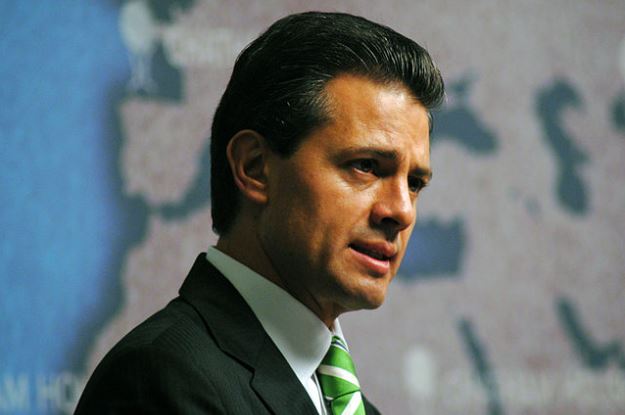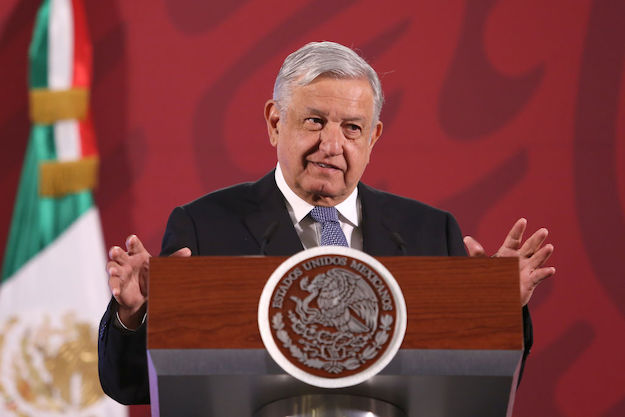Mexico’s President Enrique Peña Nieto seems to always pack a media relations strategy when traveling abroad, and this week’s trip to Canada has been no exception. Ahead of today’s North American Leaders’ Summit in Ottawa, Peña Nieto and Canada’s Prime Minister Justin Trudeau shared policy concessions over social media, were spotted getting chummy at public events, and even went on a run together for the cameras.
But back home, mounting criticism on everything from security and human rights to a struggling economy has been punctuated – yet again – by a crisis that could undermine the promise of reform that brought Peña Nieto to office four years ago.
On June 19, at least nine people were killed and more than 100 injured in the small town of Nochixtlán when federal and state police moved in to break up a series of blockades along the highway connecting Oaxaca’s state capital to Mexico City. All of the dead were civilians, and many of them had engaged in a days-long protest in support of the state’s teachers’ union, a chapter of the often-combative National Coordinating Committee of Education Workers (CNTE).
The state government of Oaxaca attributed all but one of the deaths to gunfire. Federal and state police initially denied bringing firearms – or even riot control batons – to the operation, but photographs and video from national and international news agencies on the scene have shown otherwise. After denying the authenticity of the visual evidence of armed agents at the scene, Mexico’s federal police chief later told the media that his officers had come under attack.
The waffling on the official story about the presence of armed officers at the scene proved damaging in the court of public opinion. It also galvanized strong shows of support for the teachers from residents, many of whom had, to that point, remained on the sidelines.
Indeed, the response to the crackdown has been swift and widespread, including ongoing protests in Oaxaca and a march last weekend in Mexico City led by opposition leader (and perrenial presidential candidate) Andrés Manuel López Obrador. Students at the largest universities in Mexico City also called for strikes on their campuses in the week following the deadly police action.
Government officials, for their part, have opened high-level negotiations with leaders from the CNTE, the first set of talks since the protests that sparked the crackdown began last month.
But many political analysts and media commentators have already condemned the talks to failure, with some openly speculating that negotiations would last only long enough to keep pressure off of Peña Nieto while the summit is underway. On Tuesday morning, Interior Secretary Miguel Ángel Osorio Chong, who López Obrador called on to resign in the wake of the incident, announced that the talks had indeed hit an impasse, though he said they would continue this week.
That the talks were dismissed so readily reflects just how deeply both sides are dug into their respective trenches. The CNTE is a powerful political and economic force in Oaxaca, and has often rallied its membership and network of allies to push back against federal and state policies for the better part of the last three decades.
While it’s a bit too simplistic to say that teacher opposition to changes in education policy is what’s fueling the current wave of protests in Oaxaca, it is certainly a contributing factor. The federal government passed a sweeping education reform package in 2013 that, among other things, would require performance evaluations for teachers to hold onto their jobs. Teachers in Mexico’s poorest states – including Chiapas, Oaxaca and Guerrero – say the reforms unfairly stack the deck against those already working in marginalized communities and use one-size-fits-all criteria for assessing performance despite the vastly different contexts in which they teach.
The “my way or the highway” tack has been a defining feature of the first four years of Peña Nieto’s presidency. From dismissing the opponents of a much touted energy reform to his party’s opposition to landmark anti-corruption legislation (which the president vetoed over a transparency provision for recipients of government contracts) the PRI has shown a tin ear for conciliation in its return to executive power.
Now, at precisely a time when Peña Nieto is trying to convince constituents that his reform agenda is worthwhile, the state has given the appearance of trying to paper over a clear violation of the public trust. Peña Nieto has said his government “will not respond to provocations” from the CNTE and has told teachers unions to resolve their grievances through government institutions.
The government has promised a thorough investigation into the events of June 19, but not one carried out by an independent, non-governmental body. The same federal government accused of extra-judicial killings of civilians in Nochixtlán has put itself in charge of probing the incident; this despite a call for an independent investigation by the Mexico office of the UN human rights commissioner.
The high-profile cases of the missing 43 Ayotzinapa students and an alleged army massacre in Tlatlaya have already stained the carefully-manicured image of the current administration. If the Nochixtlán deaths are swept under the rug without a credible, independent investigation, Peña Nieto may find that instead of reform he is left with a legacy that is hard to outrun, no matter who his jogging partner.
—
Young is an independent journalist based in Oaxaca City. Follow her work on Twitter at @syoungreports.








